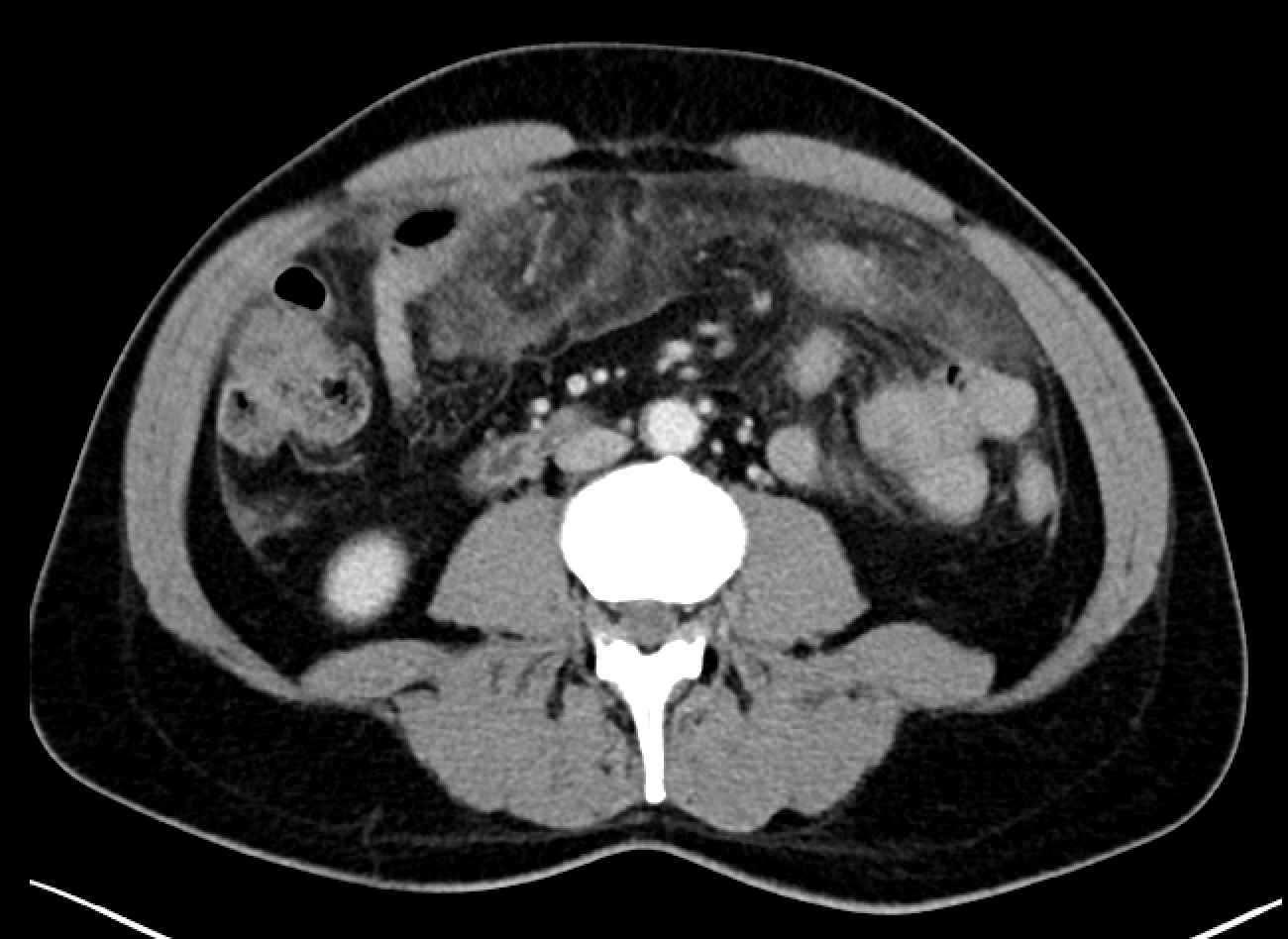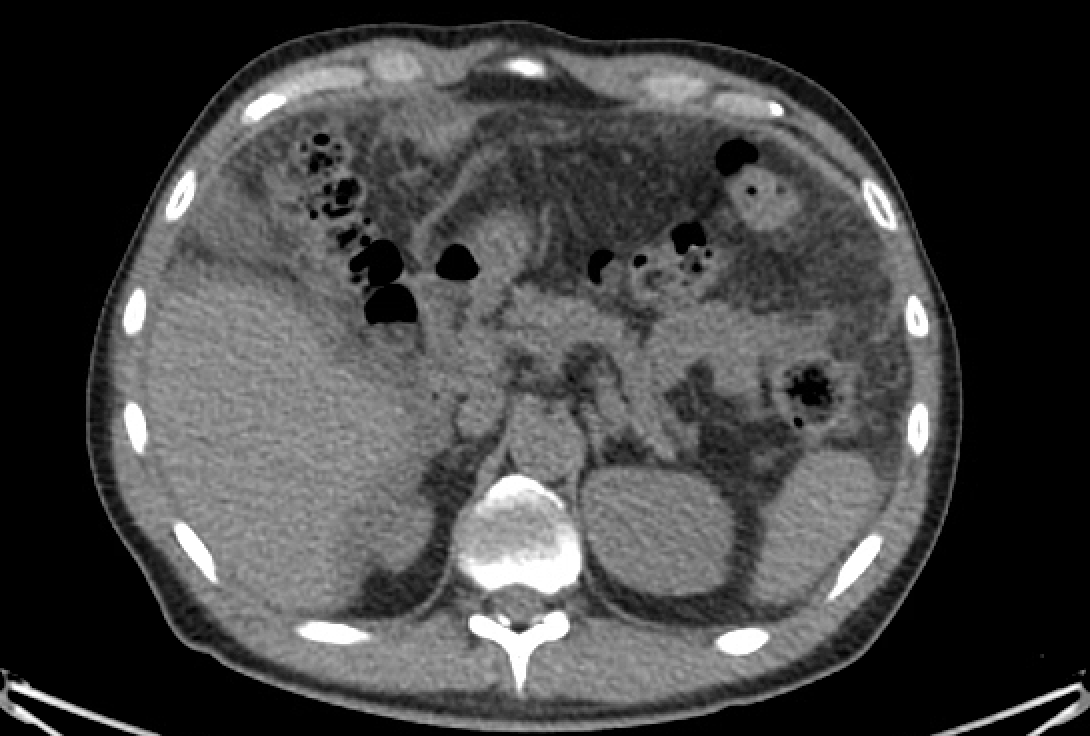Tuesday Poster Session
Category: Infections and Microbiome
P5610 - Coccidioidal Peritonitis: A Rare Manifestation of Disseminated Coccidioidomycosis
Tuesday, October 28, 2025
10:30 AM - 4:00 PM PDT
Location: Exhibit Hall

Rhett Harmon, MD (he/him/his)
Olive View-UCLA Medical Center
Los Angeles, CA
Presenting Author(s)
Rhett Harmon, MD1, Sherif Shoucri, MD2, Glenn Mathisen, MD2, Shaun Chandna, DO2
1Olive View-UCLA Medical Center, Los Angeles, CA; 2Olive View-UCLA Medical Center, Sylmar, CA
Introduction: Disseminated coccidioidomycosis, primarily a pulmonary process, can rarely extend to extrapulmonary sites with significant morbidity. Peritoneal involvement is atypical and may mimic peritoneal carcinomatosis. In endemic regions, coccidioidal peritonitis should be in the differential of patients presenting with vague abdominal symptoms, weight loss, and imaging with omental caking and ascites. Risk factors include immunocompromise and living in regions of dry climates with dusty conditions. Comprehensive evaluation can necessitate imaging, serology, and histopathology.
Case Description/
Methods: A 55-year-old male from Southern California’s desert valley region presented with several months progressive abdominal discomfort and unintentional weight loss. CT imaging of the chest revealed a spiculated pulmonary nodule with mediastinal lymphadenopathy; abdominal CT revealed a diffusely thickened peritoneum, ascites, and omental caking. Diagnostic paracentesis revealed high protein and low serum-ascites albumin gradient concerning for peritoneal carcinomatosis. Given the patient's geographical history and imaging findings serologic testing for Coccidioides was ordered, revealing elevated IgM and IgG titers. Coccidioides complement fixation testing was also positive with a titer of 1:512, supportive of a diagnosis of disseminated coccidioidomycosis. A subsequent biopsy of an infected neck epidermal cyst revealed granulomatous inflammation with large spherules containing endospores consistent with coccidioidomycosis, further supporting the diagnosis. High-dose fluconazole (800 mg daily) led to symptomatic and radiographic improvement.
Discussion: While disseminated coccidioidomycosis represents 5-10% of cases, peritoneal involvement is rare as gastrointestinal dissemination occurs in only 2.4%. In this immunocompetent patient from a Coccidiomycosis endemic region, though the initial imaging findings suggested malignancy, a high index of suspicion for this infection led to his appropriate work up and eventual diagnosis. High-dose fluconazole therapy (800 mg daily) has been reported to be effective in disseminated disease. Early recognition and treatment is important to minimize morbidity and mortality. This case of coccidiodal peritonitis highlights the need for awareness to include fungal infections in the differential for patients living in endemic areas where coccidioidomycosis can masquerade as malignancy.

Figure: PET/CT Abdomen/Pelvis with omental caking, peritoneal thickening, and ascites.

Figure: PET/CT Abdomen/Pelvis with omental caking, peritoneal thickening, and ascites.
Disclosures:
Rhett Harmon indicated no relevant financial relationships.
Sherif Shoucri indicated no relevant financial relationships.
Glenn Mathisen indicated no relevant financial relationships.
Shaun Chandna: Arrowhead Pharmaceuticals – Grant/Research Support. Calliditas Therapeutics (formerly Genkyotex) – Grant/Research Support. Ipsen – Consultant. Lipocine – Grant/Research Support. Mirum Pharmaceuticals – Consultant, Grant/Research Support.
Rhett Harmon, MD1, Sherif Shoucri, MD2, Glenn Mathisen, MD2, Shaun Chandna, DO2. P5610 - Coccidioidal Peritonitis: A Rare Manifestation of Disseminated Coccidioidomycosis, ACG 2025 Annual Scientific Meeting Abstracts. Phoenix, AZ: American College of Gastroenterology.
1Olive View-UCLA Medical Center, Los Angeles, CA; 2Olive View-UCLA Medical Center, Sylmar, CA
Introduction: Disseminated coccidioidomycosis, primarily a pulmonary process, can rarely extend to extrapulmonary sites with significant morbidity. Peritoneal involvement is atypical and may mimic peritoneal carcinomatosis. In endemic regions, coccidioidal peritonitis should be in the differential of patients presenting with vague abdominal symptoms, weight loss, and imaging with omental caking and ascites. Risk factors include immunocompromise and living in regions of dry climates with dusty conditions. Comprehensive evaluation can necessitate imaging, serology, and histopathology.
Case Description/
Methods: A 55-year-old male from Southern California’s desert valley region presented with several months progressive abdominal discomfort and unintentional weight loss. CT imaging of the chest revealed a spiculated pulmonary nodule with mediastinal lymphadenopathy; abdominal CT revealed a diffusely thickened peritoneum, ascites, and omental caking. Diagnostic paracentesis revealed high protein and low serum-ascites albumin gradient concerning for peritoneal carcinomatosis. Given the patient's geographical history and imaging findings serologic testing for Coccidioides was ordered, revealing elevated IgM and IgG titers. Coccidioides complement fixation testing was also positive with a titer of 1:512, supportive of a diagnosis of disseminated coccidioidomycosis. A subsequent biopsy of an infected neck epidermal cyst revealed granulomatous inflammation with large spherules containing endospores consistent with coccidioidomycosis, further supporting the diagnosis. High-dose fluconazole (800 mg daily) led to symptomatic and radiographic improvement.
Discussion: While disseminated coccidioidomycosis represents 5-10% of cases, peritoneal involvement is rare as gastrointestinal dissemination occurs in only 2.4%. In this immunocompetent patient from a Coccidiomycosis endemic region, though the initial imaging findings suggested malignancy, a high index of suspicion for this infection led to his appropriate work up and eventual diagnosis. High-dose fluconazole therapy (800 mg daily) has been reported to be effective in disseminated disease. Early recognition and treatment is important to minimize morbidity and mortality. This case of coccidiodal peritonitis highlights the need for awareness to include fungal infections in the differential for patients living in endemic areas where coccidioidomycosis can masquerade as malignancy.

Figure: PET/CT Abdomen/Pelvis with omental caking, peritoneal thickening, and ascites.

Figure: PET/CT Abdomen/Pelvis with omental caking, peritoneal thickening, and ascites.
Disclosures:
Rhett Harmon indicated no relevant financial relationships.
Sherif Shoucri indicated no relevant financial relationships.
Glenn Mathisen indicated no relevant financial relationships.
Shaun Chandna: Arrowhead Pharmaceuticals – Grant/Research Support. Calliditas Therapeutics (formerly Genkyotex) – Grant/Research Support. Ipsen – Consultant. Lipocine – Grant/Research Support. Mirum Pharmaceuticals – Consultant, Grant/Research Support.
Rhett Harmon, MD1, Sherif Shoucri, MD2, Glenn Mathisen, MD2, Shaun Chandna, DO2. P5610 - Coccidioidal Peritonitis: A Rare Manifestation of Disseminated Coccidioidomycosis, ACG 2025 Annual Scientific Meeting Abstracts. Phoenix, AZ: American College of Gastroenterology.
